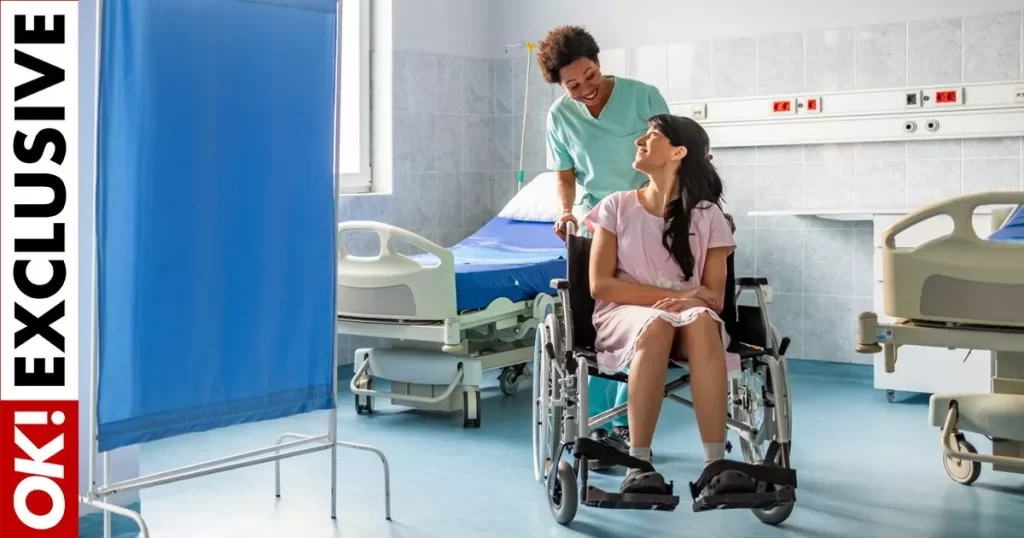Video LoadingVideo UnavailableClick to playTap to playThe video will auto-play soon8CancelPlay nowGet daily celeb exclusives and behind the scenes house tours direct to your inboxMore Newsletters SubscribePlease enter a valid emailSomething went wrong, please try again later.More NewslettersWe use your sign-up to provide content in ways you’ve consented to and improve our understanding of you. This may include adverts from us and third parties based on our knowledge of you. More infoThank you for subscribing!We have more newslettersShow me See OurPrivacy Notice See OurPrivacy Notice×Group 28 Get daily celeb exclusives and behind the scenes house tours direct to your inboxInvalid emailSomething went wrong, please try again later.Sign UpNo thanks, closeWe use your sign-up to provide content in ways you’ve consented to and improve our understanding of you. This may include adverts from us and third parties based on our knowledge of you. More info×Group 28Thank you for subscribing!We have more newslettersShow MeNo thanks, closeSee our
Privacy NoticeKerry Thompson, 43, from Milton Keynes, who has muscular dystrophy, spent 10 years trying to have cervical screening despite a previous test showing abnormalities. Eventually she got a hospital appointment, but the delay meant that she was told she needed different tests under general anaesthetic and spent 24 hours in a high dependency ward. “My situation could’ve been avoided if someone could have spoken to me about getting a referral rather than saying they couldn’t cater for me,” she said. “Everything comes down to knowledge. Knowledge is power. Having the right equipment is easier for everybody, not just us. It becomes easier for the staff, for the surgery, for the hospital.” Since that incident, Kerry has been able to access cervical screening, and is keen to speak about adaptations that can be made when it comes to making tests more accessible to people with disabilities.
Kerry Thompson from Milton Keynes has been campaigning for better screening for 10 years
(Image: Kerry Thompson)
Breast Cancer Now has emphasised the importance of making services accessible to all
(Image: Getty Images)
Read More
Related Articles
‘My nana has Alzheimer’s – Christmas feels very different this year’
Read More
Related Articles
5 simple ways to support people with dementia at Christmas
“There needs to be a room with a hoist. There needs to be a room big enough to be able to have a wheelchair, to be able to have five or six members of the hospital staff,” she said. “Every hospital should have a room that caters for someone with a disability.” Hannah Wright, policy and public affairs officer at Jo’s Cervical Cancer Trust agreed, and stated that Jo’s Cervical Cancer Trust is working to raise awareness among healthcare professionals. “We want them to reflect on their GP practices by considering whether it’s accessible and then doing something about it,” she said. “We’re also trying to tackle stigmas and say that disabled women have every right to access screening.” When it comes to breast screening services, Breast Cancer Now emphasised the importance of making services accessible to all. “We urgently need breast screening services to be equally accessible to all eligible women and to have enough staff and resources to offer the care women deserve,” said Manveet Basra, associate director of public health, inclusion and awareness at Breast Cancer Now.
Paralympian Helene Raynsford has been given the all-clear but underwent chemotherapy, a double mastectomy and reconstruction surgery
(Image: Helene Raynsford)
Associate director of public health, inclusion and awareness at Breast Cancer Now, Manveet Basra says we ‘urgently need breast screening services to be equally accessible’
(Image: Breast Cancer Now)
“As part of Breast Cancer Now’s #NoTimeToWaste campaign, we’re calling for the government to urgently invest in breast screening to remove barriers to screening and support units and to modernise the programme.” Having experienced good access to breast cancer screening herself, Helene Raynsford, 43, who was diagnosed with breast cancer in 2013, wants others to be able to share her positive experience when accessing care. “The government is in the process of investing a huge amount of money for extra mobile screening sites. That’s brilliant, but we need to make sure those sites are accessible from day one – most current mobile units have steps,” she said. “Also, we need to make sure the letter that comes out says that ‘if you have any accessibility requirements, please ring this number’ and that those on the end of the line are trained appropriately. It’ll make people think that, actually, the screening is open to them. “I’m a wheelchair user, and my MRIs were always at the same place and in a mobile unit which always had a lift, so I never had problems with access.” However, after Helene got her diagnosis, she noticed a difference in her ability to access some services, and recalled one particularly “degrading” moment. “The majority of mammogram machines are built for people who can stand. I was given a stool to balance on, but I couldn’t so I had three strangers pinning me up when I was naked from the waist up,” she said. “It was a degrading and humiliating experience. If that had been my experience at a screening for the first time, I’m not sure I would have wanted to go back.” Breast Cancer Now is the research and support charity for anyone affected by breast cancer. Call 0808 800 6000, or visit breastcancernow.org. Jo’s Cervical Cancer Trust is the UK’s leading cervical cancer charity. Call 0808 802 8000, or visit jostrust.org.uk. To learn more about the International Day of Persons with Disabilities, visit idpwd.org Story SavedYou can find this story in My Bookmarks.Or by navigating to the user icon in the top right.Follow OK! MagazineFacebookTwitterCommentMore OnHealthReal Life












